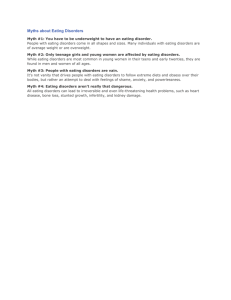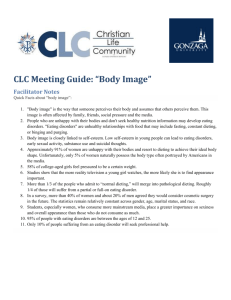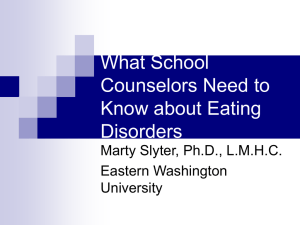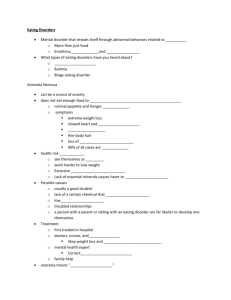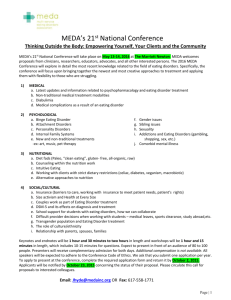Popular Links
advertisement
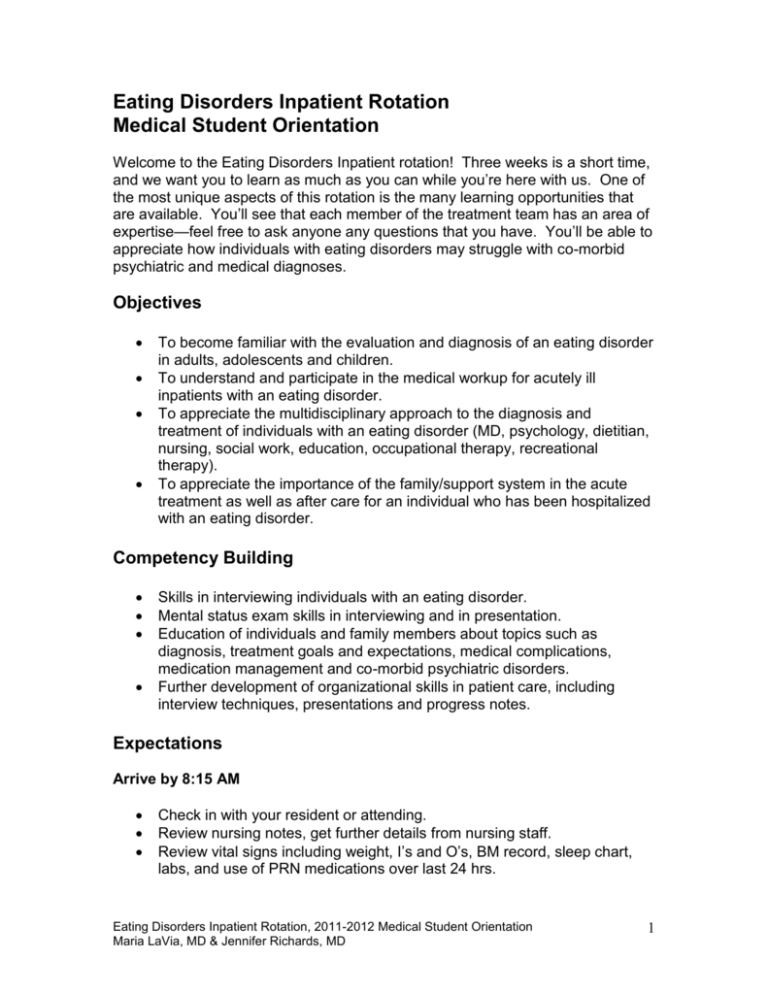
Eating Disorders Inpatient Rotation Medical Student Orientation Welcome to the Eating Disorders Inpatient rotation! Three weeks is a short time, and we want you to learn as much as you can while you’re here with us. One of the most unique aspects of this rotation is the many learning opportunities that are available. You’ll see that each member of the treatment team has an area of expertise—feel free to ask anyone any questions that you have. You’ll be able to appreciate how individuals with eating disorders may struggle with co-morbid psychiatric and medical diagnoses. Objectives To become familiar with the evaluation and diagnosis of an eating disorder in adults, adolescents and children. To understand and participate in the medical workup for acutely ill inpatients with an eating disorder. To appreciate the multidisciplinary approach to the diagnosis and treatment of individuals with an eating disorder (MD, psychology, dietitian, nursing, social work, education, occupational therapy, recreational therapy). To appreciate the importance of the family/support system in the acute treatment as well as after care for an individual who has been hospitalized with an eating disorder. Competency Building Skills in interviewing individuals with an eating disorder. Mental status exam skills in interviewing and in presentation. Education of individuals and family members about topics such as diagnosis, treatment goals and expectations, medical complications, medication management and co-morbid psychiatric disorders. Further development of organizational skills in patient care, including interview techniques, presentations and progress notes. Expectations Arrive by 8:15 AM Check in with your resident or attending. Review nursing notes, get further details from nursing staff. Review vital signs including weight, I’s and O’s, BM record, sleep chart, labs, and use of PRN medications over last 24 hrs. Eating Disorders Inpatient Rotation, 2011-2012 Medical Student Orientation Maria LaVia, MD & Jennifer Richards, MD 1 Participate in Morning Rounds Take the lead in interviewing the patient, asking about ability to meet nutritional exchanges and fluid goal, family interactions, therapeutic passes, and progress in working toward next phase in treatment. Perform a thorough review of systems to evaluate for physical complaints. Facilitate feedback from treatment team, staff and peers. Attend Treatment Team Briefly present each assigned patient. Facilitate input from treatment team members. Summarize the treatment plan for the day. After Team Clarify questions from team with resident/attending, staff, social work. Work with resident/attending on writing orders (use CPOE), following up on tests/labwork, contacting family or outpatient providers, consulting other medical services, etc. Participate in scheduled family meetings involving your patients. Participate in therapeutic groups, cognitive behavior therapy (CBT), dialectical behavior therapy (DBT), nutritional groups, occupational therapy (OT), recreational therapy (RT). Other Expectations Document progress notes in WebCIS; have resident/attending review for feedback. Use time in the afternoons not spent with patients, groups, and families to look up information on clinical topics of interest related to eating disorders. You will be expected to give 2 brief presentations on a topic related to eating disorders during this rotation. Complete one history and physical assessment, including differential diagnoses and preliminary treatment plan; present it to your attending MD. When possible, attend and participate in pre-admission outpatient evaluations with other members of the treatment team (attending/resident, dietician, social work). Working with your patients A few pointers: Meet with your patients where others can see you. Physical exams should be done in the treatment room with a chaperone of the same gender of the patient. Eating Disorders Inpatient Rotation, 2011-2012 Medical Student Orientation Maria LaVia, MD & Jennifer Richards, MD 2 If you feel uncomfortable or confused about an interaction with a patient, don’t hesitate to seek guidance from your resident or attending. A Note on Confidentiality Most of what a patient will tell us will be confidential, i.e. we do not share with families unless the individual gives us permission. The only exceptions are issues that involve harm to self and/or others. Please remember the following: Federal law prohibits us from giving any information about substance use to others without the patient’s permission; this includes results of drug screens. The patient should be told that you may need to share otherwise confidential information with your resident, attending and/or treatment team, who of course will respect the patient’s confidentiality. Sexual information (except that involving harm to self/others) is also confidential. Working with families You’ll discover that more often than not there is a need for psycho-education about eating disorders along with a number of questions about how to be supportive of treatment goals. Therefore, we do a lot of work with patients and families, which typically follows this pattern: Initially meeting with the family and individual separately to get an idea of the problems(s) from every perspective Counseling the patient regarding their diagnoses, treatment and the role of the family in recovery Educating the family regarding the eating disorder, treatment and the family’s role in recovery Helpful ideas in communicating with parents: Begin by joining your resident, attending and social workers in their contacts with families. Offer your observations based on your interactions with the patient. It may be useful to make the goal of your initial parent contacts to be relaying factual information—e.g., lab results, consult recommendations. Let your resident, attending and/or social worker know if you have any concerns re: family contacts A Note on Informed Consent Given that parents/guardians must consent for all psychotropic medications we prescribe for minors, and that the evidence base for many of the medications is limited and therefore prescribing is sometimes “off-label,” UNC Hospitals takes informed consent very seriously. Eating Disorders Inpatient Rotation, 2011-2012 Medical Student Orientation Maria LaVia, MD & Jennifer Richards, MD 3 Document in your progress note that you have discussed: Indication(s) for medication/potential benefits Potential risks/adverse events Treatment alternatives, risks/benefits Risks/benefits of not treating “Off-label” status if applicable Parents can sign the medication consent form, or you and a witness can sign the form if consent is by phone. To this end, we recommend the AACAP-endorsed website www.parentsmedguide.org to parents of children or adolescents being prescribed antidepressants. Try to Get Some Experience With Teaching patients and families about diagnoses and treatment recommendations, relapse prevention strategies Group process in the therapeutic community Cognitive Behavior Therapy (CBT) Dialectic Behavior Therapy (DBT) Interpreting and providing patient education regarding test results, including labs, EKG, and DEXA scans Medical procedures such as naso-gastric tube (NGT) insertion Eating Disorders Inpatient Rotation, 2011-2012 Medical Student Orientation Maria LaVia, MD & Jennifer Richards, MD 4




